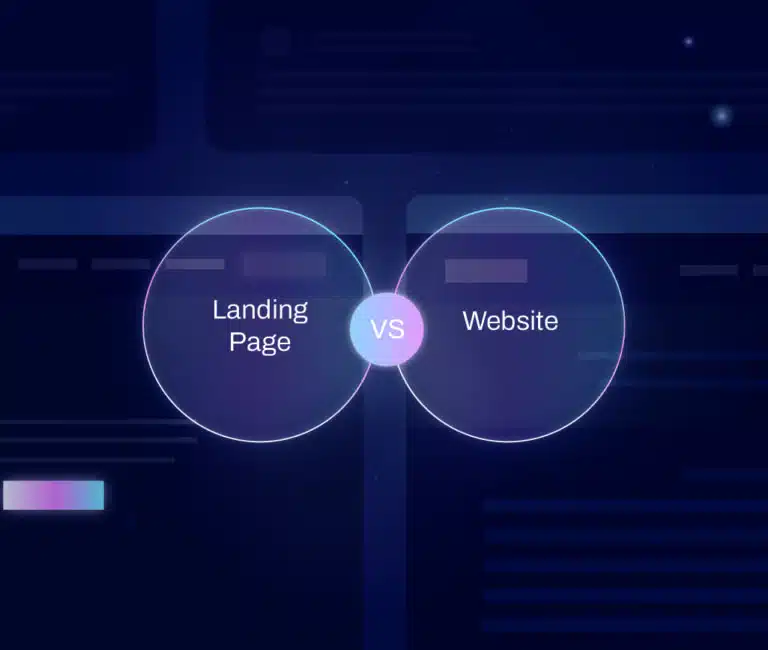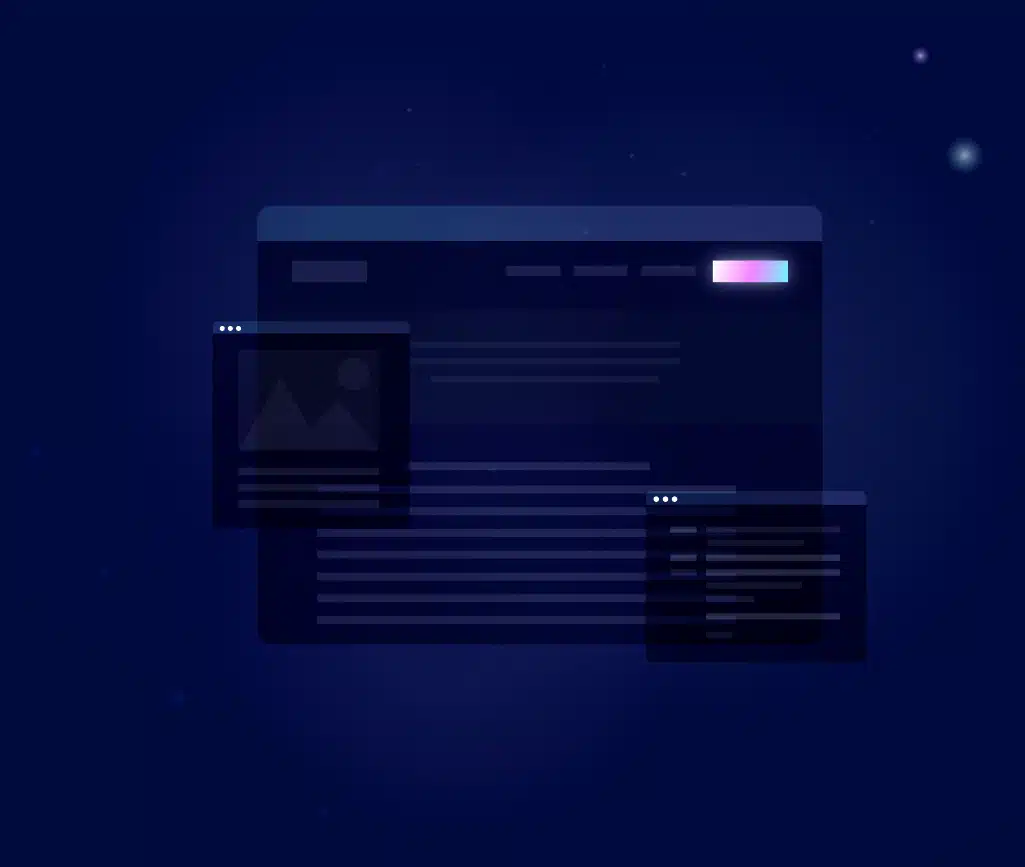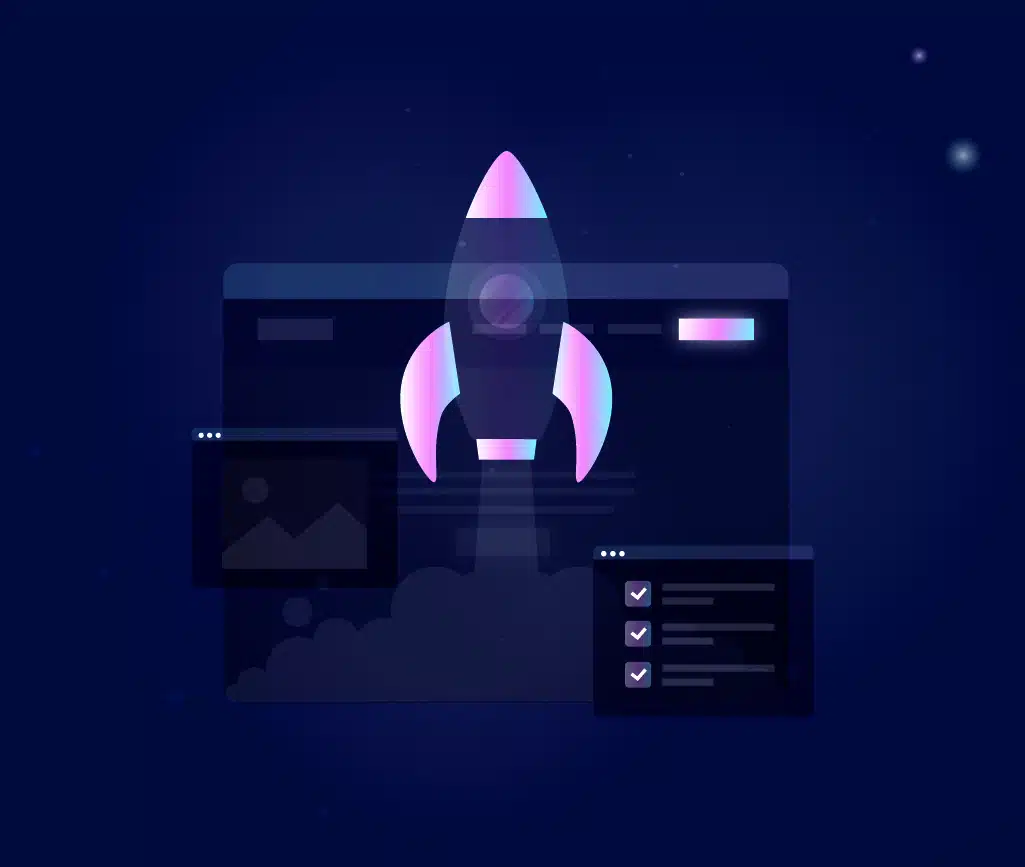Development
8 minute read
Landing Page vs Website: What Are the Differences?.
LAST UPDATED:
February 29, 2024


Do you know the difference between a landing page and a website?
If you don’t, don’t worry — most people are unaware of the differences. Many people use the terms interchangeably.
But there are some significant differences between these two types of pages.
What’s a landing page? What difference is there between a landing page and a homepage?
How does each type fit into your business, and more importantly, can you use both of them simultaneously for your business?
All good questions!
Let’s dive right in and take a look at what those differences are and which is right for your business. Read on to learn more!
In a nutshell, a website is designed to give visitors an overview of your business.
At the same time, a landing page is focused on getting visitors to take a specific action (such as making a purchase or signing up for a newsletter).
A landing page is like an aisle of a store for your customers.
It contains everything they need to know about your product or service, and there’s no getting lost in a sea of links and pages.
Websites, on the other hand, are like department stores.
There’s a lot to take in, so you need clear signage (aka web page titles) and a helpful sales associate (aka website navigation) to guide visitors to what they’re looking for.
Here are the two main differences between websites and landing pages.
1. Number of Web Pages
The most notable difference between landing pages and websites, in general, is the number of web pages they have.
Landing pages are just single pages of information. Where everything needed to be shared is found in one place.
Websites typically have several pages and a navigation system. This is due to the number of pages included on a website, and navigation needs to be straightforward to use for users to navigate the website’s web pages.
You’ll often see a navigation bar at the top or along the side of a website with different sections labeled.
This makes it easier for users to find what they’re looking for on a website with lots of content.
For example, if someone were looking for information on products offered by a company, they would click on the “Products” page instead of having to scroll through the entire website to find what they’re looking for.
In short, websites have multiple pages, while landing pages only have one, and websites need straightforward navigation so users can easily find what they’re looking for.
2. Purpose
While both have their unique advantages, in the end, websites and landing pages serve the same purpose: to share information that will make potential customers purchase your product or service.
However, landing pages and websites have different methods of achieving that purpose.
Landing pages are typically single pages with critical information designed to keep users on the page until they decide to make a purchase.
On the other hand, websites are usually several pages with information split up based on what makes sense for the company’s website navigation system.
So which is better?
In reality, it depends on the business’s goals and needs.
Landing pages are great for businesses with a single product or service, as they can provide all the critical information about that product or service on one page.
However, a website may be a better option if a business has multiple products or services, as it can provide more detailed information about each one.
Of course, their differences are more complex. Let’s take a closer look at what landing pages and websites are and if they fit into your business.
First, let’s take a look at landing pages.
What Exactly Are Landing Pages?

Landing pages are stand-alone pages designed with a specific goal or purpose in mind.
The most common goals are related to marketing, advertising, or lead generation.
For example, you may have clicked on an ad that brought you to a landing page promoting a product that is “coming soon.”
The company wants you to sign up for their email list so they can notify you when the product launches.
This is a typical use of a landing page design is to promote something that is not yet available.
Other times, businesses use landing pages to promote a specific product or service.
They will include pricing, images, videos, and testimonials on the page, so the user has everything they need to decide and take action, such as buy now, sign up, etc.
If you are running any online business, it’s essential to have at least a few well-designed landing pages to capture leads and convert them into customers.
What’s Their Purpose?
A landing page is a web page that allows you to achieve a specific goal that you have set.
This could be to increase awareness of a new product or service or to increase sales of a specific product or service.
No matter the purpose, every landing page must have one vital element: a Call-to-action (CTA) that results in the end goal of the page. The latter can be getting a user’s email through subscribing to an email list, pre-ordering something, or paying for a digital product. Alternatively, you could use a LinkedIn email finder Chrome extension to obtain a list of emails.
After all, what’s the point of having a fantastic landing page if there are no CTA driving users to convert?
For example, if you want to increase sales of a new product, your CTA might be “Buy Now” or “Add to Cart.”
On the other hand, a website is a series of connected web pages that share information with users.
What Exactly Is a Website?

It’s like an online brochure for your business, describing every aspect of your products or services.
Just like an actual brochure, a website needs to be well-designed and easy to read if you want people to stick around.
A great website is like a one-stop shop for potential customers or users and can help you convert leads into customers or subscribers.
What’s Their Purpose?
A website’s purpose is twofold:
- To break up much information without overwhelming the user
- To have different sections of content with other goals and purposes depending on the target audience and the web page’s end goal
Consequently, each page on the website might have a lower conversion rate than a landing page.
Instead, the goal of a web page might be to showcase a new product or get people to sign-up for an email list, but not do both.
You wouldn’t want your homepage to try and do too many things at once — it’s better to have a focused purpose that matches the user’s needs and drive them towards that goal.
Otherwise, they’ll get confused and bounce away faster than you can say “website.”
Remember, the goal of every website is to leave users with a manageable amount of information and provide them with an easy way to navigate toward what they’re looking for.
There’s no easy answer as to whether landing pages or websites are better.
Whether you should have a website, landing page, or both depends on your specific needs and goals.
A website is a way to go if you want to build a long-term brand with many different types of content and features.
On the other hand, if you’re trying to drive traffic to one specific offer or product, then a landing page might be all you need.
Of course, there’s always the option of having both!
Which One Should I Pick?

The important thing when deciding between the two is to figure out what’s right for your business. Ask yourself some questions:
- What are your goals?
- Who is your target audience?
- What kind of content do you want to create?
Once you have answers to these questions, you’ll be able to decide which route is best for you.
Things To Consider About Landing Pages vs a Website
There’s a lot to think about when deciding whether to build a website or a landing page.
On the one hand, websites are great for giving people an overview of what you do and providing lots of information.
On the other hand, landing pages are designed to persuade people to take a specific action, like signing up for a newsletter or buying a product.
Which should you choose? Here are some factors to consider.
Frequency of Redesigns
If you only plan on making changes to your online presence every few years, then a website might be the better option.
Websites require more initial work than landing pages, but they are easier to update sporadically.
On the other hand, a landing page might be a better fit if you like to experiment with new designs and features constantly.
Landing pages are easier to create and revise, so you can make as many changes as possible without taxing your resources.
Protip
Beware of website redesign mistakes, you want to redesign your website to better serve your potential customers with helpful content and updates!
Your Resources
Do you have a large team of designers and developers at your disposal? Building and improving a website might be the right choice for you.
If you have few resources, then simplifying your online presence with a landing page might be the way to go.
Landing pages require fewer human resources to create and maintain, so they’re a good option if you work with limited resources.
Hoping To Build Long-term Relationships?
A website is beneficial for building relationships with your customers that will last for years.
Websites provide more opportunities for interaction and connection than landing pages do.
With a website, you can include features like blog posts, forums, and customer testimonials that will help you connect with your customers on a deeper level.
If all you’re looking for is a quick transaction, a landing page might be all you need.
What’s the verdict? Should you have a website or a landing page?
Well, it depends.
If you want to achieve one goal (and only one goal), then a landing page is likely your best bet.
But a website with multiple web pages is likely more effective if you want to achieve several goals simultaneously.
Ultimately, it’s up to you and your company to decide what will work best for your customers and your business. Don’t forget — at Huemor Rocks, we are always here to help!
Contact us today to discuss how our marketing experts can create an online strategy that drives sales by appealing to how your customers think.
Get Memorable Insights.
Sign up to receive actionable web design advice directly in your inbox monthly.
Get Memorable Insights.
Sign up to receive actionable web design advice directly in your inbox monthly.
Author
Jeff Gapinski is the President of Huemor where he helps plan the long-term strategic growth of the agency. Jeff is passionate about UI/UX, demand generation, and digital strategy.
What Do You Think?
Have feedback? Maybe some questions? Whatever it is, we'd love to hear from you.




![Website Design Standards We Follow [That You Should Too!]](https://huemordev.b-cdn.net/wp-content/uploads/2021/12/2023.04.04.Website-Design-Standards-We-Follow-That-You-Should-Too.jpg.webp)



No comments found